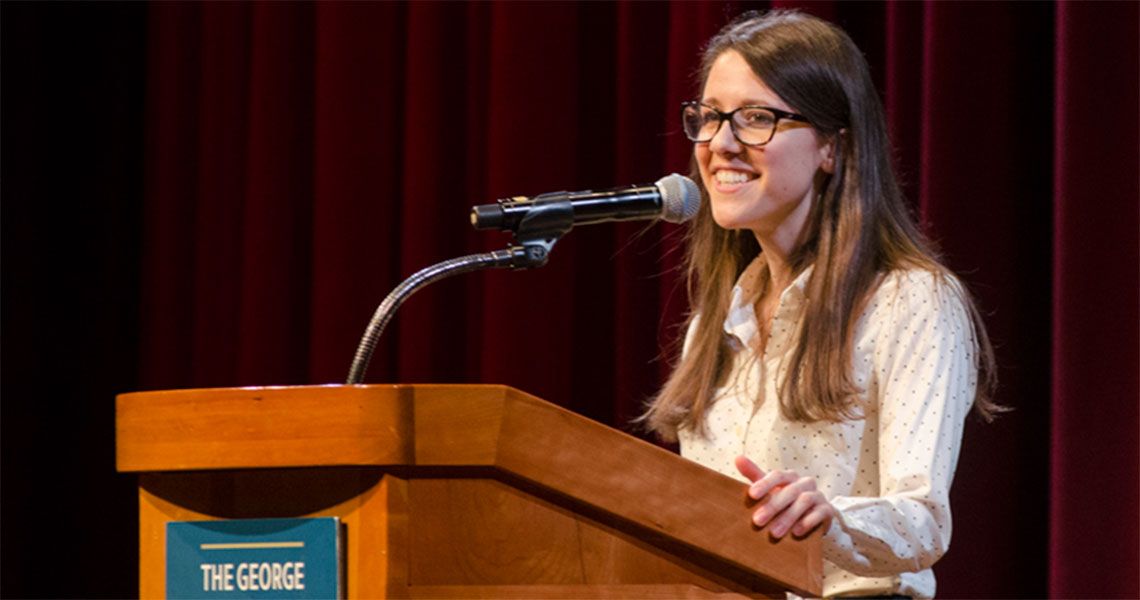The order of operations was straightforward: first, Christina Pugliese, now a second-year MD student at the George Washington University (GW) School of Medicine and Health Sciences (SMHS), applied for a health services scholarship as part of the SMHS global health track; next, after being awarded the funding, she met with mentor David Diemert, MD, associate professor of medicine at SMHS; he then contacted colleagues abroad about research opportunities.
That’s how Pugliese, during the summer following her first year of medical school, found herself studying cryptosporidium, a parasite that causes diarrhea in a large proportion of children under age five, in Gabon, Africa.
“It was really wonderful,” Pugliese said, adding that she also conducted an individual study, a general assessment of how children with diarrhea are treated. “For me, it’s been the highlight of my schooling so far. That’s a huge thing, to take advantage of the [research] opportunities that are here; supplementing your education with things you’re passionate about makes it more exciting and enriching.”
Pugliese, whose abstract is featured in student-led journal Fusion, was also selected as one of the winners of the William H. Beaumont Medical Society Student Research Award. The prize is given annually by research faculty to three research abstract authors, coinciding with GW’s Research Days, held April 10 and 11 this year. The second day, in particular, is dedicated to health and medicine.
“Research, discovery, innovation, and knowledge advancement is a core part of the mission of every medical school, every academic medical center,” said Jeffrey S. Akman, MD ’81, RESD ’85, vice president for health affairs, Walter A. Bloedorn Professor of Administrative Medicine, and dean of SMHS. “Today is our day to celebrate as we hear … about your own interests in research and potentially building your own research careers.”
Pugliese, along with winners Nicole Casasanta, Sarit Toltzis, and Dara Baker, presented their research to their peers, an experience both nerve-racking and rewarding.
“It’s extremely exciting to share the work we did with the school community,” said Casasanta, whose research with co-author Toltzis focused on Oncotype DX, a prognostic and predictive test for breast cancer and its relationship with hereditary cancer syndromes. “As you work on your own study and you’re critiqued by experts in your field, you learn how to better evaluate other clinical studies that can play a role in your patients’ care. I think it’s an important part of medicine.”
Dara Baker, who studied the mechanisms behind the drug DFMO and how it interacts with Helicobacter pylori, bacteria that can cause gastric cancer, likened her peers’ response and the award to “a little gold star to my research. You work so hard on this for two months, and people recognize that.”
Their reactions are precisely what keynote speaker Mary Woolley, president of Research!America, believes researchers need to do: advocate for their work by talking about it.
“Advocacy is about making the case – enthusiastically, I might add – for something that we’re passionate about and proud of being part of. Like anything else, when you’re trying to convince people to be on your side of a movement, something giant or something smaller, it’s about building relationships.”
What’s key, she explained, is talking to non-scientists: the public and policymakers. “People want you to succeed ... Put your face on what you do so that other people know about it. And remember that the most important four words that you, a researcher, can say and convey are: I work for you.”
Research!America, the largest U.S. not-for-profit, grassroots organization aiming to make medical and health research a higher national priority, found that the public wants policies to be based on science and that research drives economic growth. Learning how to articulate the value of research and emphasizing what researchers can do for the nation is essential, she said.
“People want to have others working for them, they want you to be working for them. … I want you to make my life healthier, I want you to make my family’s life healthier and stronger, I want our nation to be more prosperous, I want research to drive our economy as it has in the past many decades, I want you to succeed, and I didn’t realize you were working for me,” she said. “Those are the conversations we want to have.”
At the SMHS level, students presented posters on their research, discussing methods and results with fellow classmates, professors, and Research Day attendees.
“There’s a huge number of people presenting,” said Fusion editor Sarah McCormack, a second-year medical student. She and fellow editor and second-year student Janine Amirault, in sifting through the record number of abstract submission for the journal, also decided to focus this year’s work on GW.
“It put the emphasis on work that’s being done by GW students while they’re at GW medical school. We thought that was really important,” McCormack said. “We’ve made a lot of progress.”



